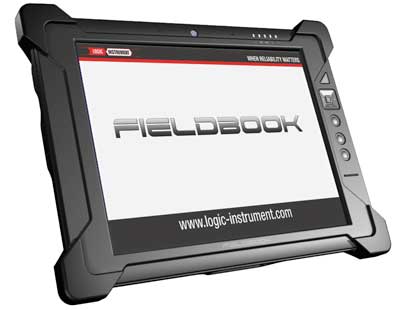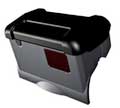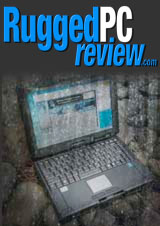Logic Instrument announced the rugged Fieldbook B1 tablet in early March of 2013. It is a 10.4-inch design that can survive drops up to six feet and is equipped with new technologies such as NFC-enabled RFID and 4G LTE. Logic Instrument's goal with the B1 is to offer a tool that makes work in the field more efficient even in extreme environments.

Technologically and from a design point of view, the Fieldbook B1 is a mix of old and new. It is an elegant design with its nicely integrated protective bumpers, but it's an elegance different from the slender glass and polished metal look prevalent in consumer media tablets. The 10.4-inch display offers 1024 x 768 pixel resolution, which means it's the same resolution as the original iPad and the iPad 2 on a screen of almost the same size, and that worked out well for the iPad.
What's very different from a consumer tablet, though, is the much higher weight (more than twice that of a 10-inch consumer tablet), the use of a resistive digitizer instead of capacitive multi-touch, and, of course, the fact that the Fieldbook B1 runs Windows 7 Pro on an Intel Atom N2600 processor. All of this means that while the Fieldbook B1 offers the screen real estate of an iPad and addresses the requirements of business customers for extra ruggedness, it's a modern version of a traditional Tablet PC rather than a ruggedized media tablet.
In terms of physical specifications, the Fieldbook B1 measures 8.75 x 11.6 inches (222 × 294 mm) and is 1.6 inches (41 mm) thick. The 3.25 lbs. weight is actually quite a bit less than that of many traditional 8.4-inch class rugged tablets that usually weigh between four and five pounds.
As of late 2012, early 2013, the Intel Atom N2600 used in the Fieldbook B1 has become quite popular in Windows tablets as a cost-efficient and fully x86-compatible processor solution that offers a good balance between performance and power consumption. It's an interesting scenario as Microsoft itself is pushing its Surface tablets that use either ARM processors in the RT version or full Core processors in the Pro versions, and also with Intel pushing their latest "Clovertrail" Atom Z2760 for tablets. And while the N2600 has scored well in RuggedPCReview benchmark testing (including good graphics performance), there are issues with its use with Windows 8. That's not a concern here as Logic Instrument is offering the B1 with Windows 7.
For storage, like more and more providers of rugged computing equipment, Logic Instrument has moved from rotating media to solid state disks. Customers can specify SSDs from 32 to 128GB.
Another decision Logic Instrument made was staying with resistive touch at a time where virtually all customers have become used to the effortless elegance of projected capacitive multi-touch on their consumer smartphones and tablets. The argument in favor of resistive touch is that it works in the rain and with gloves on, though many operations in the complex Windows 7 require the precision of a passive stylus rather than touch. Also, given Windows 7's good support of active electromagnetic digitizers that provide precision drawing, signatures, HWR and the always useful cursor tracking, we'd have liked to see an active pen as at least an option.
In the ruggedness department, the B1 does well. Logic Instrument can boast of a six foot drop, a very wide -4 to 122 degree Fahrenheit operating temperature range, IP65 sealing, and the company also provides detailed data on several other ruggedness tests and testing criteria. Note, though, that some of the ruggedness levels vary with the type of optional equipment installed.
 Onboard connectivity is also a strong side with two USB 2.0 ports, LAN via a USB Mini-B port, and even legacy RS232 support via USB. On the wireless side there is dual-band 802.11b/g/n WiFi, Bluetooth 4.0 and optional 3.5G WWAN or 4G LTE, and Logic Instrument also offers up to three additional functions via a snap-on module (see picture on the right) than may include GPS, 1D/2D barcode scanner and NFCIP-1 RFID (NFCIP-1 stands for Near Field Communication Interface and Protocol). The Fieldbook B1 also has an ambient light sensors, and two cameras that support geotagging, 5mp in the rear and 2mp upfront.
Onboard connectivity is also a strong side with two USB 2.0 ports, LAN via a USB Mini-B port, and even legacy RS232 support via USB. On the wireless side there is dual-band 802.11b/g/n WiFi, Bluetooth 4.0 and optional 3.5G WWAN or 4G LTE, and Logic Instrument also offers up to three additional functions via a snap-on module (see picture on the right) than may include GPS, 1D/2D barcode scanner and NFCIP-1 RFID (NFCIP-1 stands for Near Field Communication Interface and Protocol). The Fieldbook B1 also has an ambient light sensors, and two cameras that support geotagging, 5mp in the rear and 2mp upfront.
For power, the standard 28 watt-hour Li-Polymer battery is perhaps a bit small for a Windows tablet and many customers will likely go for the optional second battery that makes batteries hot-swappable and the tablet capable of full-shift operation.
Overall, with the Fieldbook B1, Logic Instrument offers a tablet that combines the hugely popular 10-inch display size with impressive ruggedness and connectivity in a device that's still light enough to easily be carried around. It's perfect for applications that require full Windows 7 functionality and legacy Windows infrastructure support.



